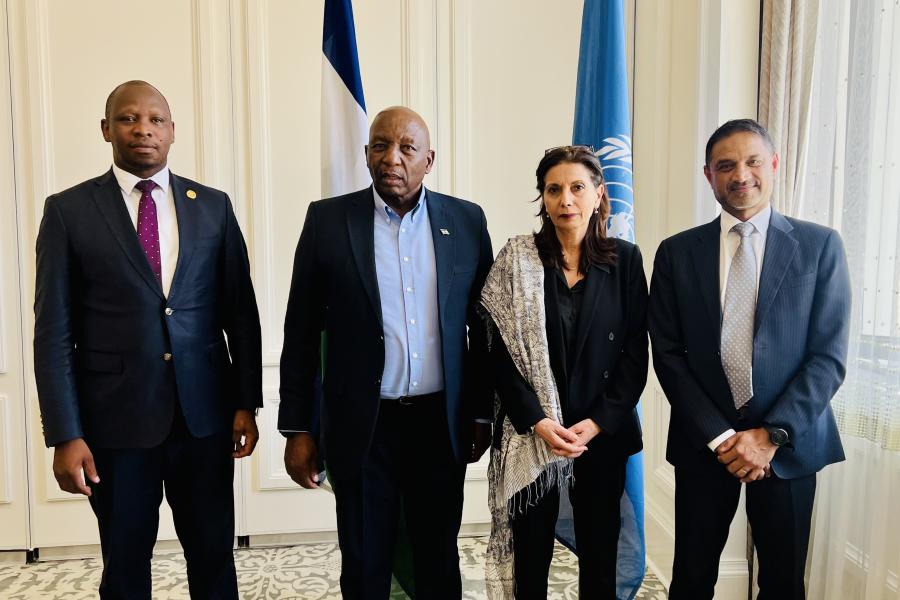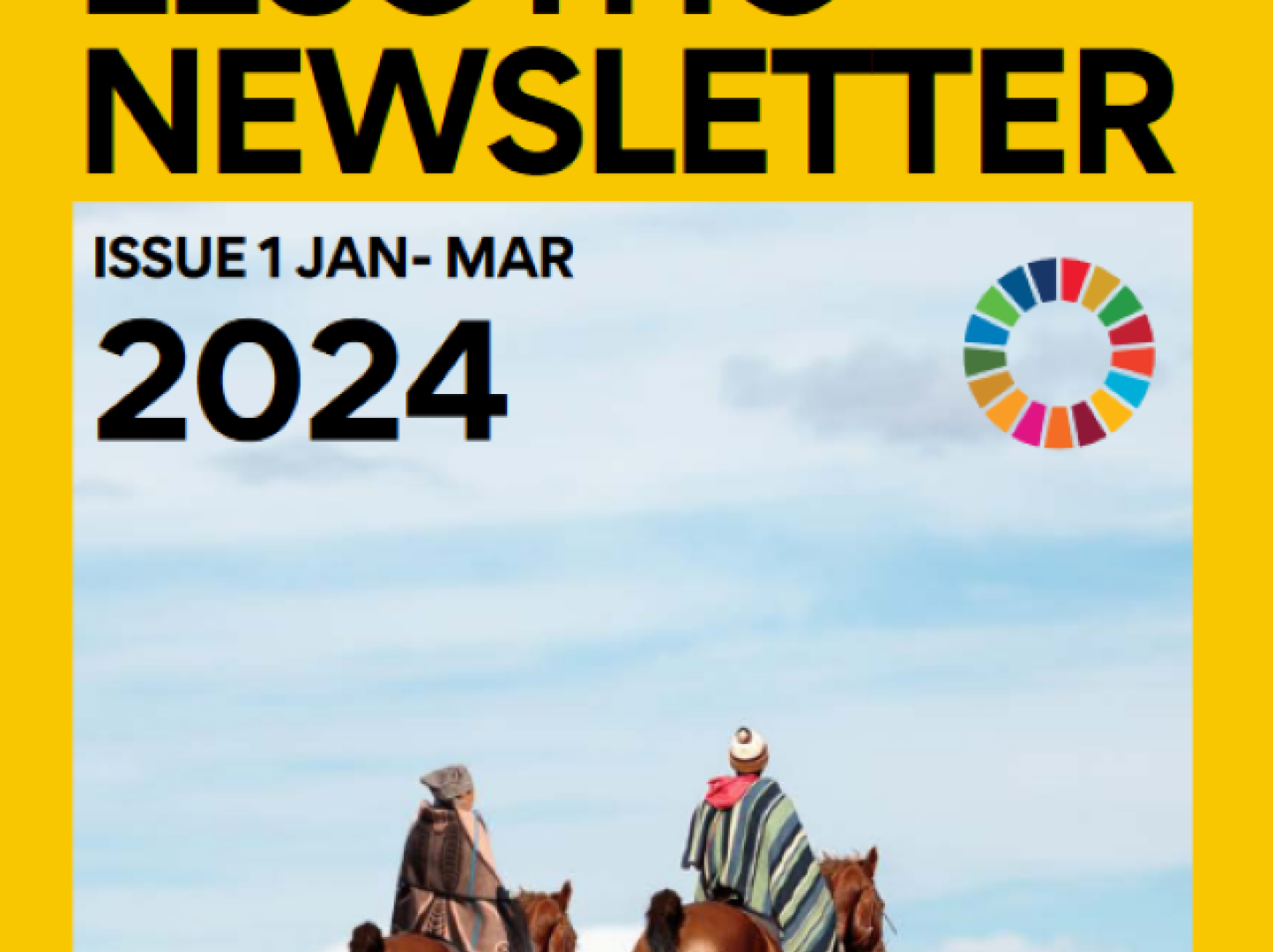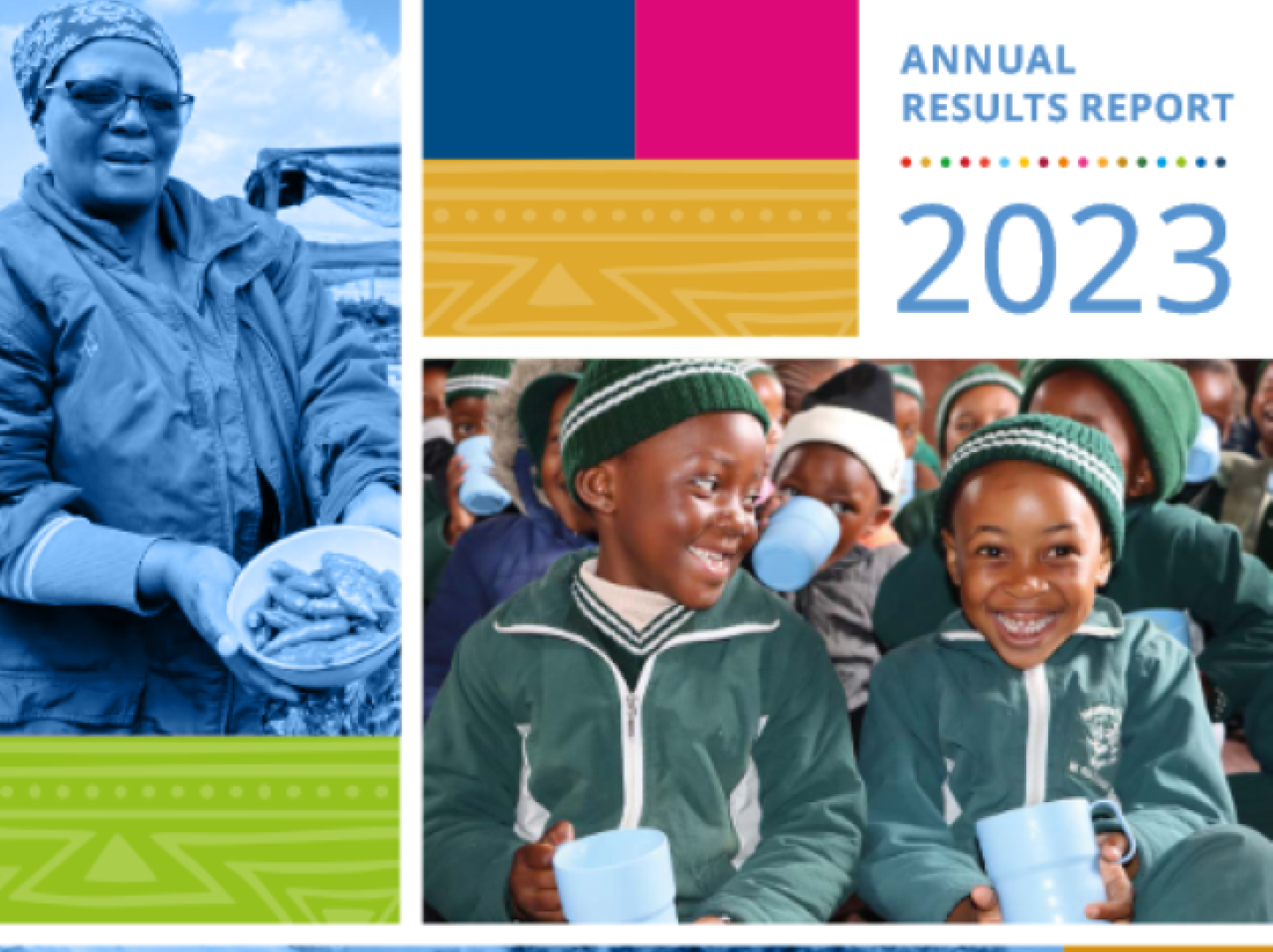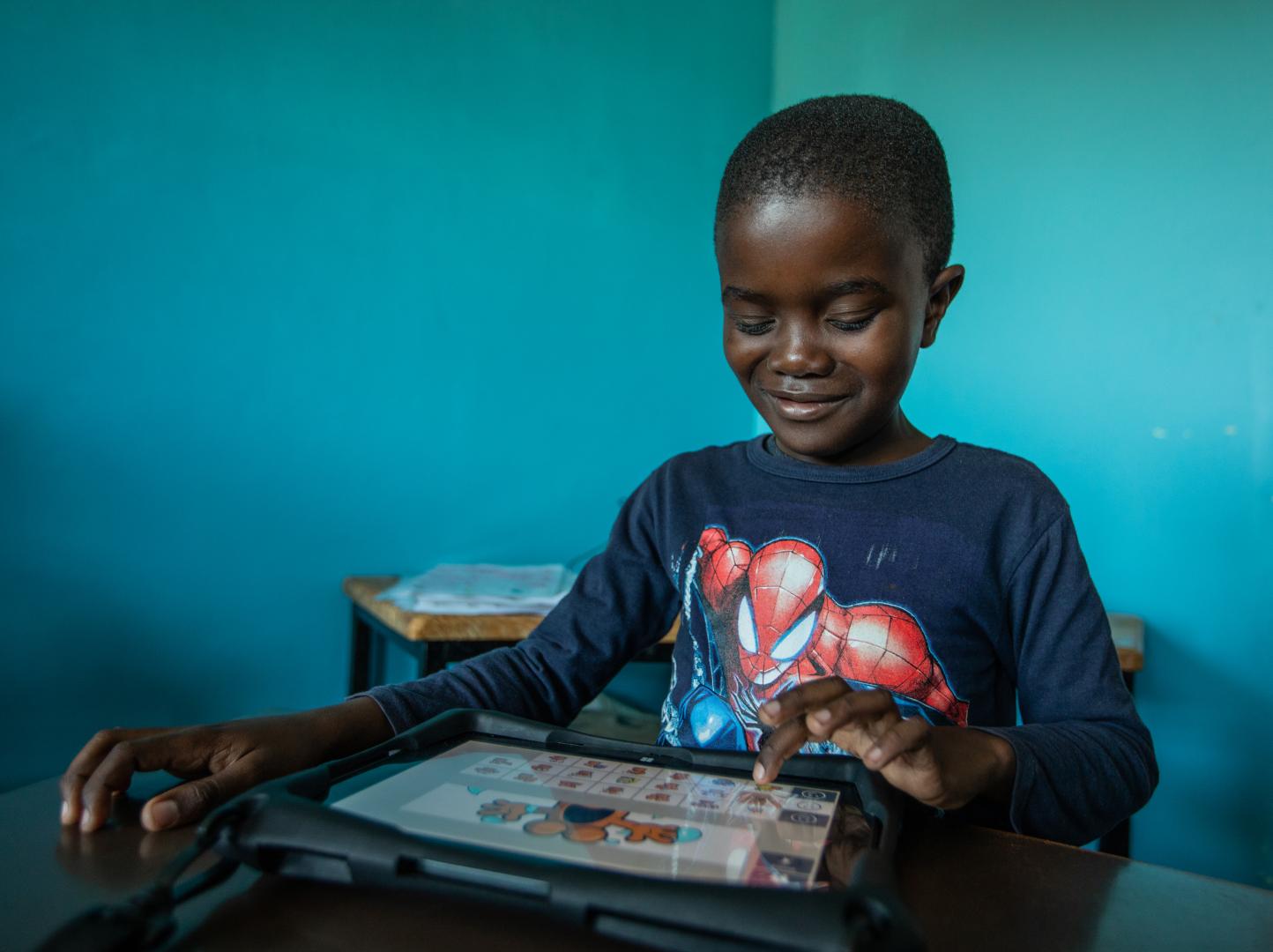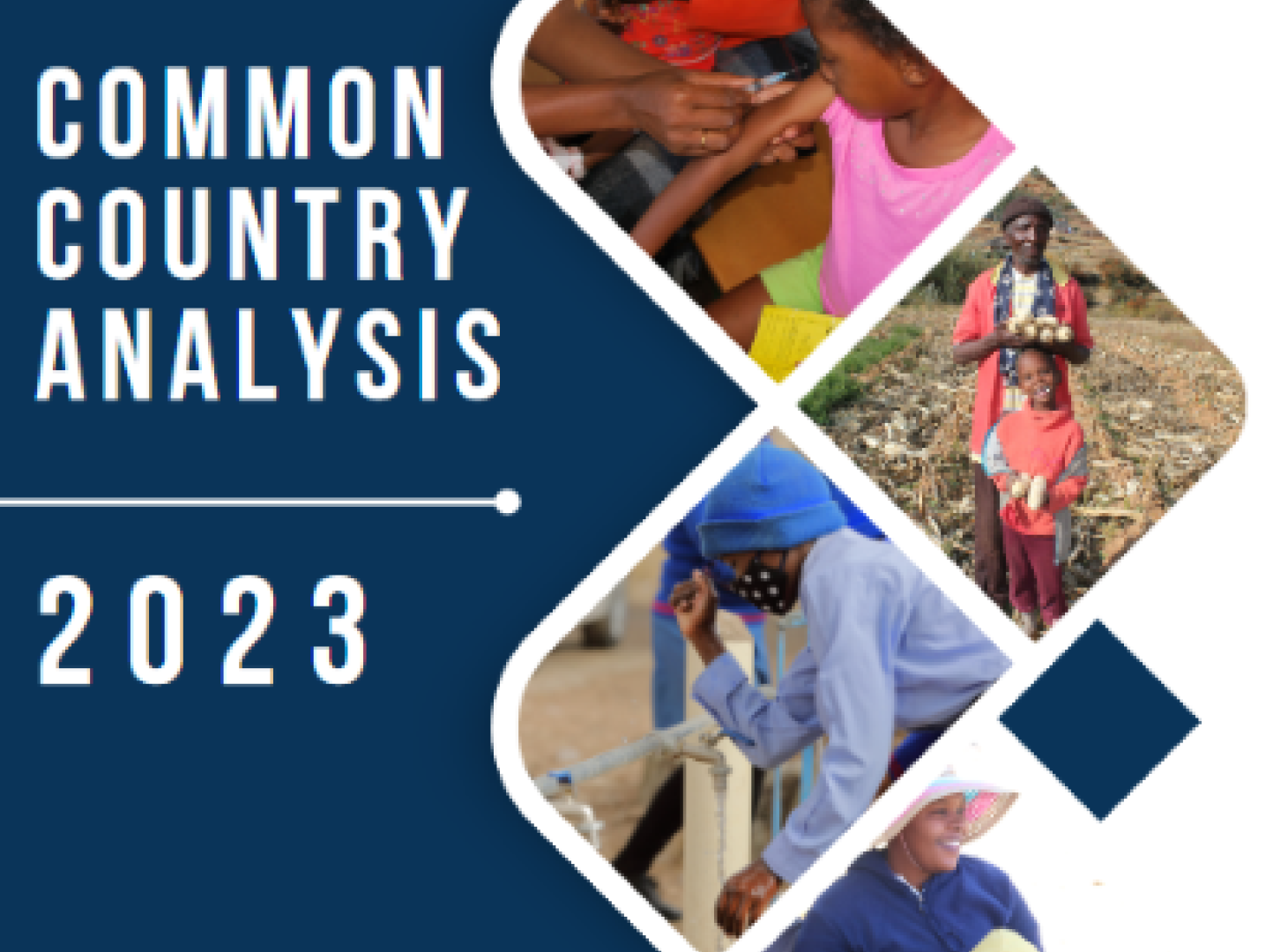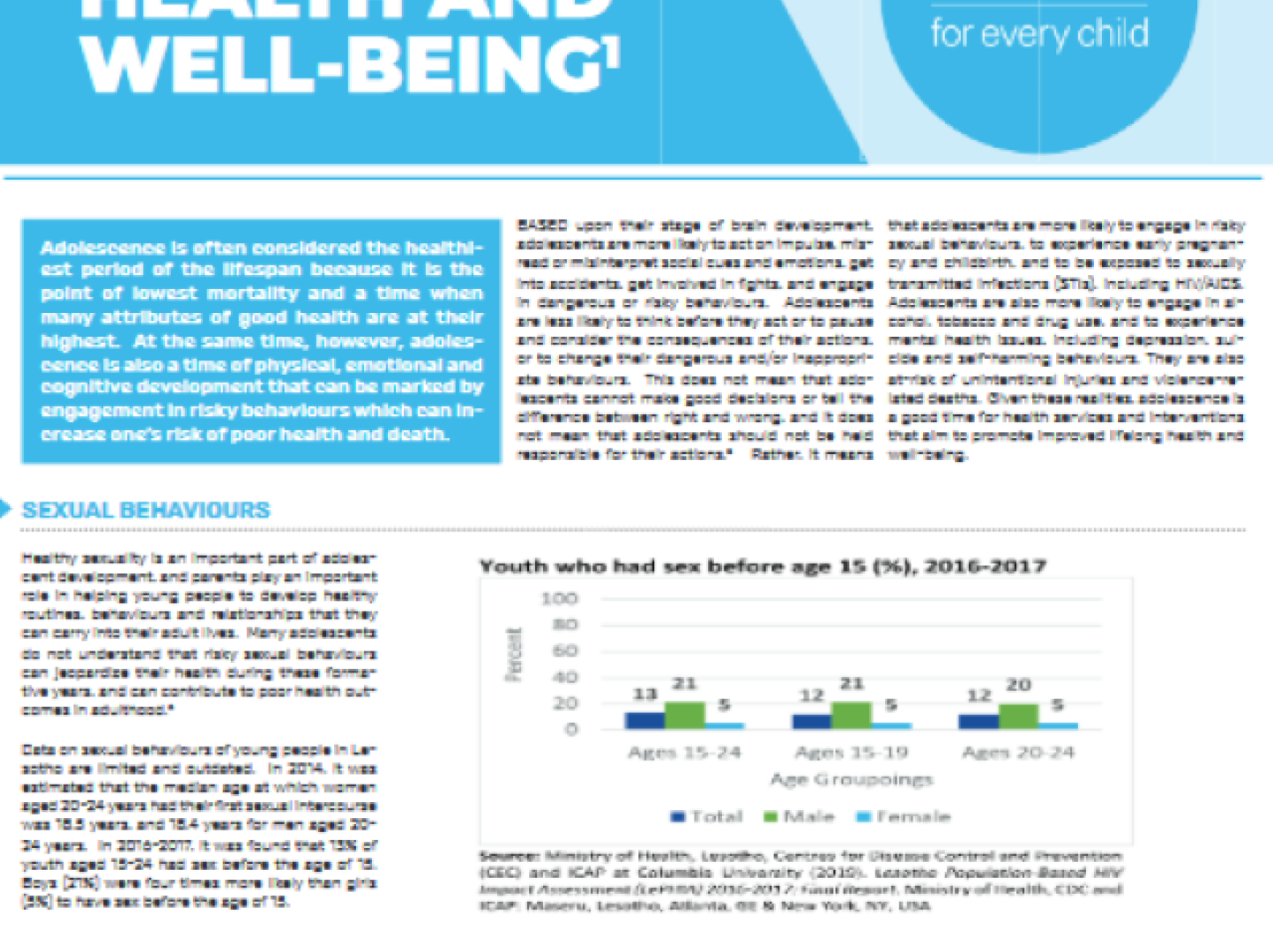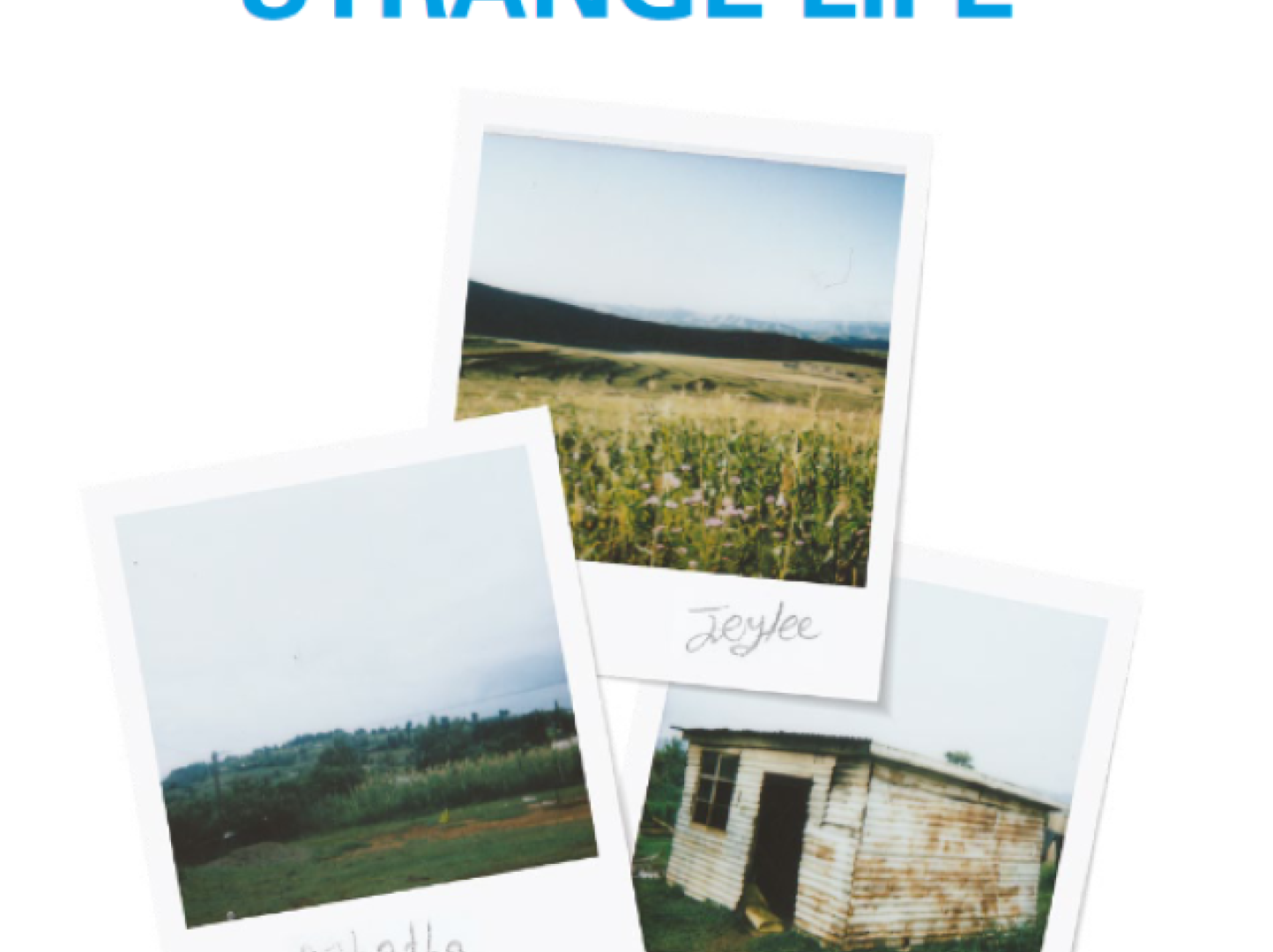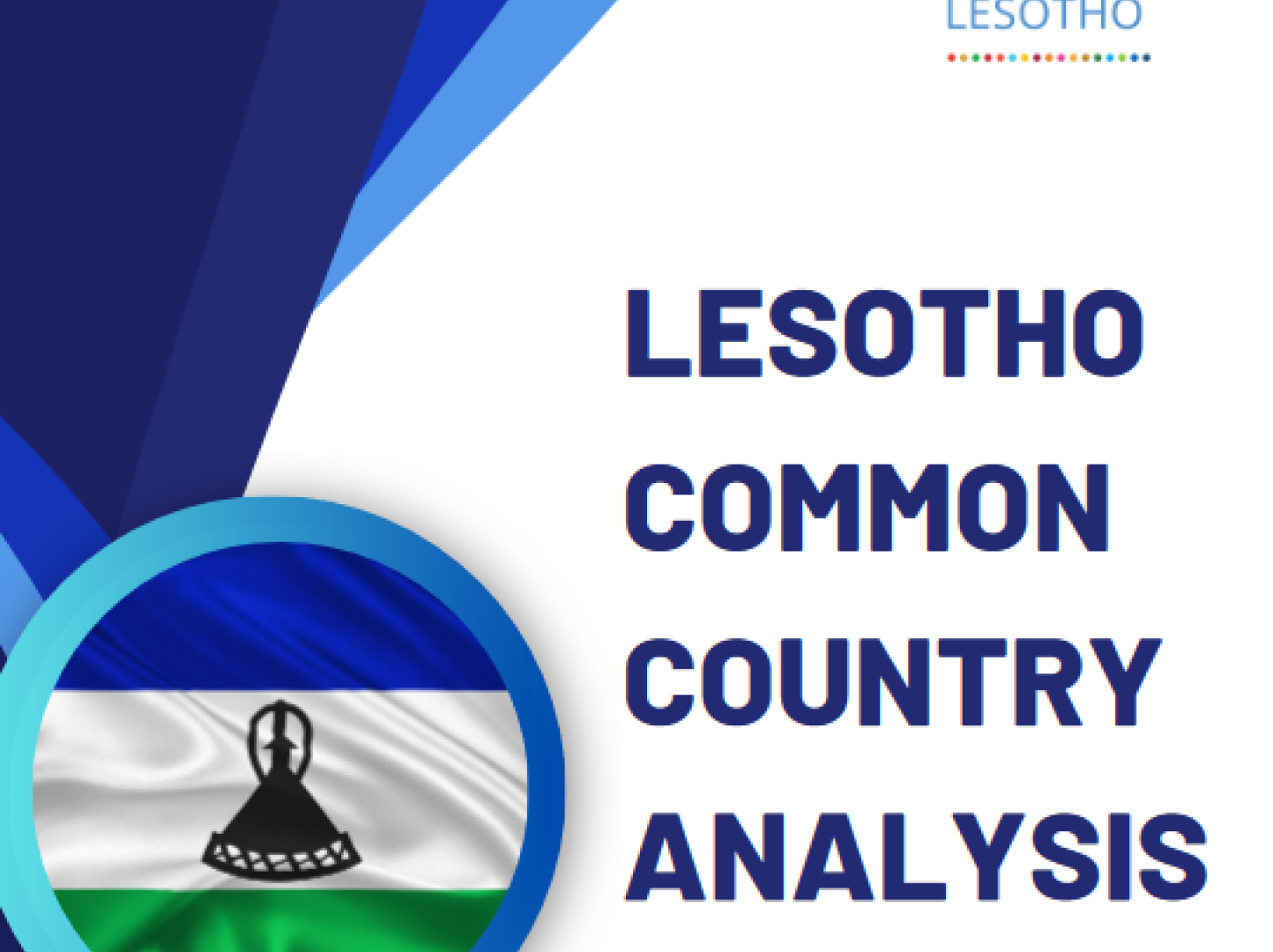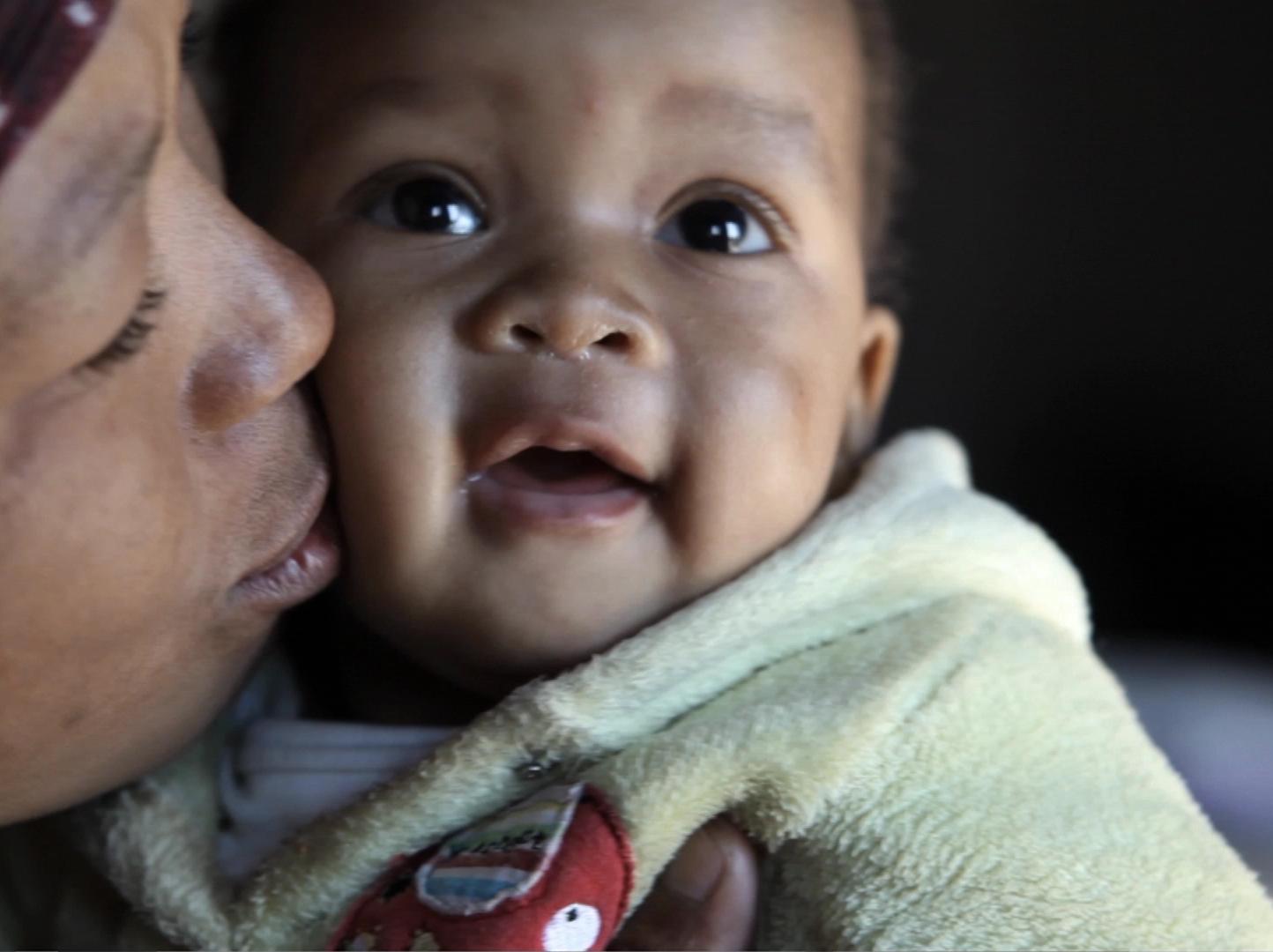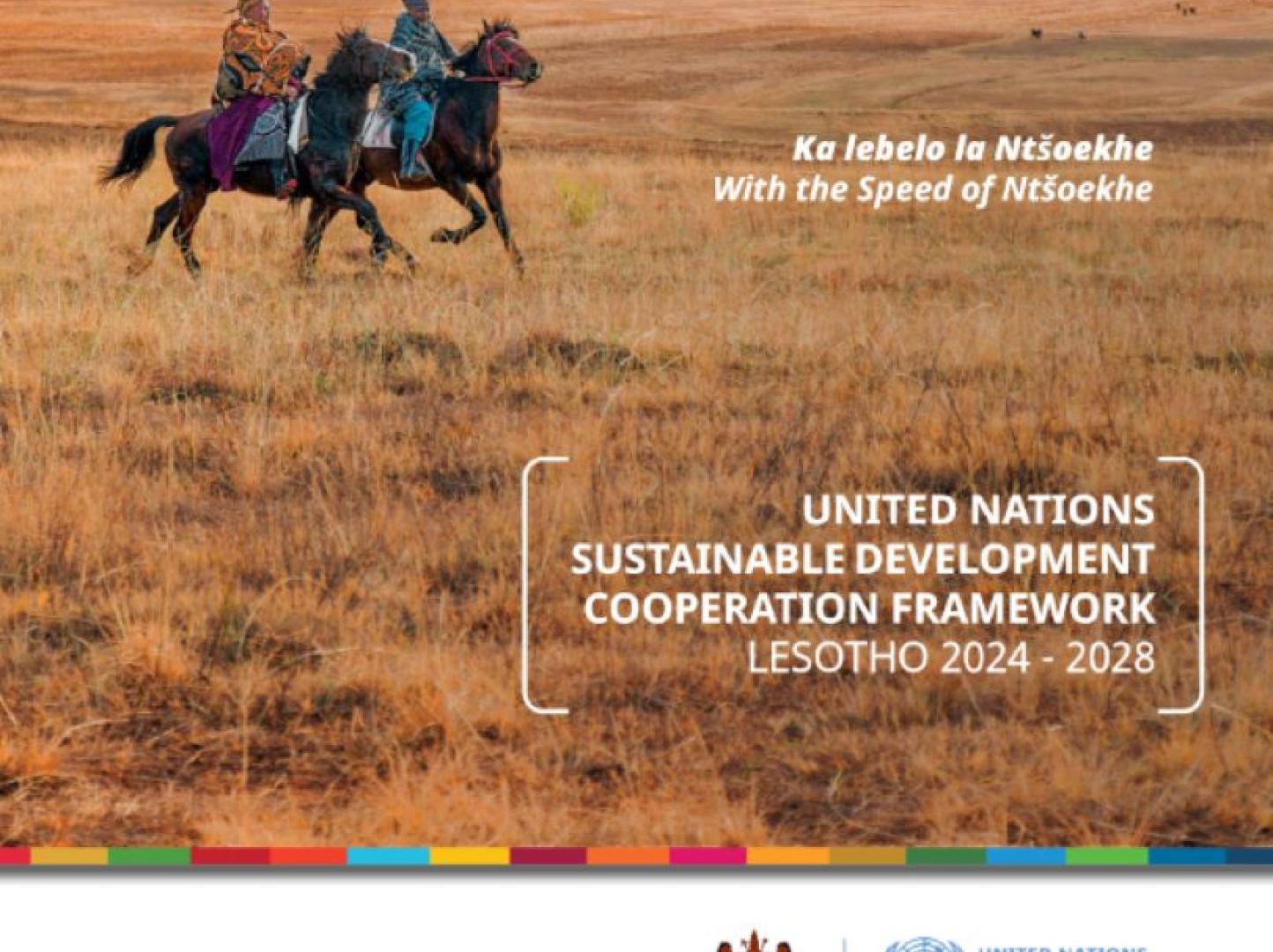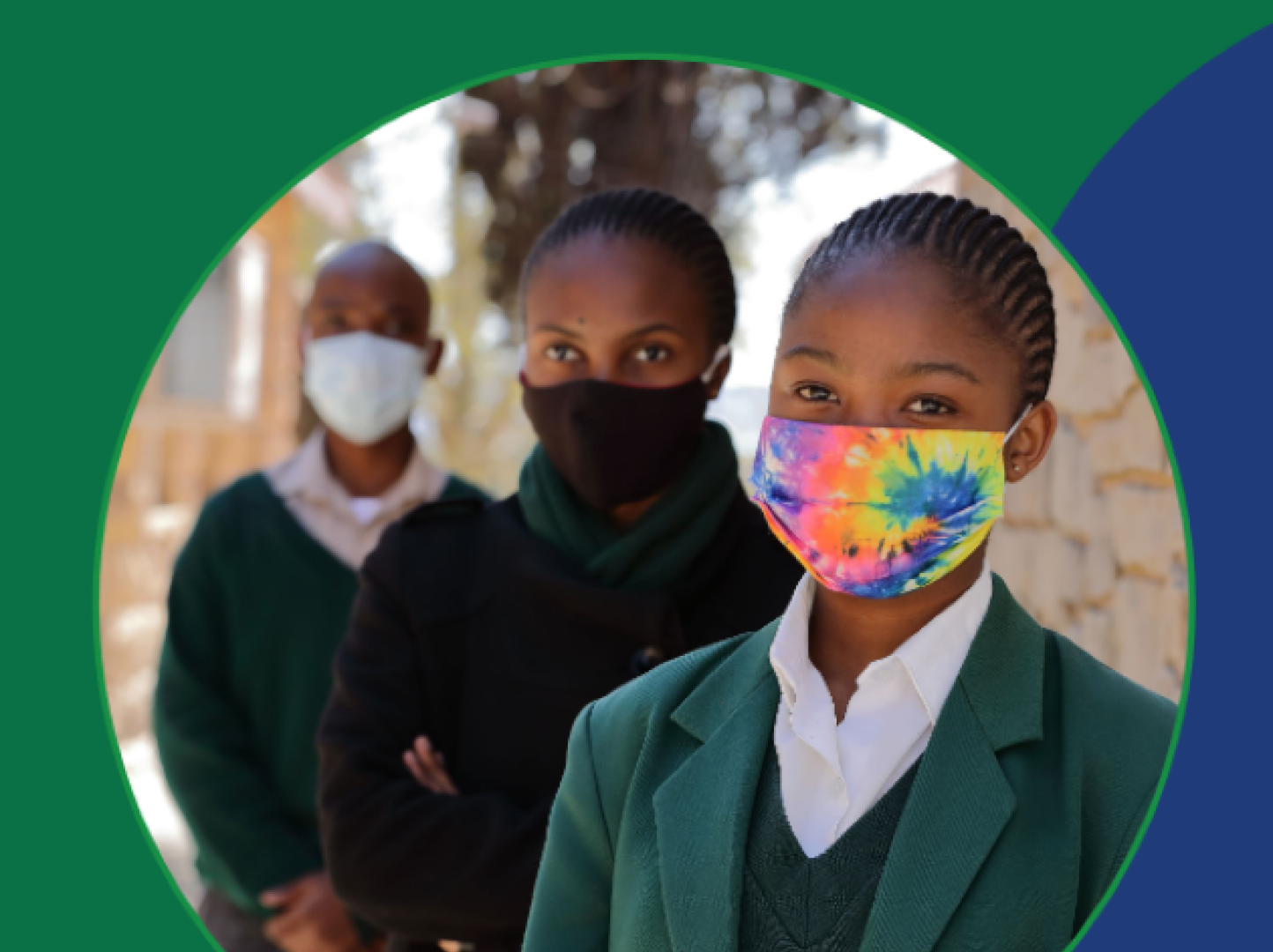Latest
Story
22 April 2024
Special Representative of the Secretary-General on Violence against Children Visits Lesotho: A Catalyst for Change
Learn more
Press Release
27 March 2024
Lesotho's Ambassador For A Day Competition 2024 Winners Revealed
Learn more
Press Release
28 February 2024
PRINCIPALITY OF MONACO HELPS WFP PROVIDE HOME GROWN SCHOOL FEEDING IN LESOTHO
Learn more
Latest
The Sustainable Development Goals in Lesotho
The Sustainable Development Goals are a global call to action to end poverty, protect the earth’s environment and climate, and ensure that people everywhere can enjoy peace and prosperity. These are the goals the UN is working on in Lesotho:
Publication
08 April 2024
Annual UNCT Results Report 2023
This document showcases the United Nations' accomplishments and its impact in Lesotho over the past year. Operating under the strategic guidance of the United Nations Development Assistance Framework (UNDAF) for 2019–2023, it outlines the UN's vision and contribution towards achieving the development goals set forth by the Lesotho government. The report highlights how the UN Country Team (UNCT) ensures that the execution of the UNDAF aligns with and supports Lesotho's national priorities and objectives. It also underscores the synergy of resources, expertise, and knowledge across the UN family—both within the country and globally—to support the government's efforts in fast-tracking progress towards the Sustainable Development Goals.
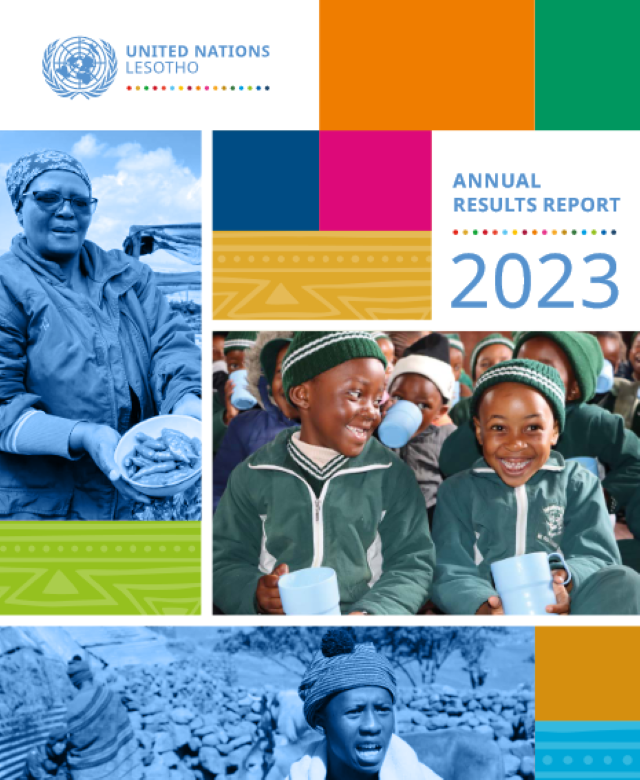
Story
22 April 2024
Special Representative of the Secretary-General on Violence against Children Visits Lesotho: A Catalyst for Change
From the 15th to the 17th of April 2024, Dr. Najat Maalla M’jid, the Special Representative of the Secretary-General on Violence against Children, marked her first visit to Lesotho since the start of her appointment in 2019. This visit coincided with her attendance at the 43rd Ordinary Session of the African Committee of Experts on the Rights and Welfare of the Child held in Maseru. Dr. M’jid's schedule was packed with not only her participation in the conference but also several important bilateral meetings aimed at addressing critical issues facing children in Lesotho.A Series of High-Profile MeetingsDr. M’jid’s engagements in Lesotho brought her face-to-face with a number of the nation’s most influential figures. Among them were Her Majesty, Queen Masenate Mohato Seeiso, Prime Minister Samuel Matekane, Dr. Ntoi Rapapa the Minister of Education, and Mpotjoane Lejone, the Minister of Foreign Affairs and International Relations. The United Nations Country Team in Lesotho, representatives from civil society organizations, and Dr. Mahlape Morai, the Acting Commissioner of Police, also held discussions with Dr. M’jid.The objective of these meetings was multifold: to raise awareness about the plight of children in Lesotho, to assess the progress and challenges in safeguarding children's rights, and to catalyze action across all sectors of society.Dr. M’jid commended Lesotho for its investments in education, acknowledging the steps the country has taken towards improving the lives of its youngest citizens. However, she also pointed out that despite these efforts, significant challenges remain. Issues such as child labor, child marriage, and violence against children persist. The discussions revealed a pressing need for the acceleration of laws and policies aimed at protecting children. Dr. M’jid emphasized, “In my engagements with the various stakeholders who work on children’s issues in Lesotho, I can say that there is progress, however, there are still many challenges. We need to work to ensure sustainable access for all children.”Recognizing the complexities of the issues at hand, Dr. M’jid advocated for practical, sustainable solutions. She highlighted the essential role of establishing a human rights commission aligned with the Paris Principles to guarantee the rights' enjoyment for everyone, particularly children. She pointed out the imperative of incorporating children in decision-making, financial, and development strategies that prioritize the safeguarding of children's rights as a foundation for their genuine rights enjoyment and protection. According to Dr. M’jid, children are not just beneficiaries but are part of the solution to the challenges they face such as violence and the negative influence of gang culture.Moving Forward: A Unified ApproachThe visit by Dr. Najat Maalla M’jid to Lesotho represents a pivotal moment in the country's ongoing efforts to protect and promote the rights of children. It highlights the international community's commitment to supporting Lesotho in its endeavors but also underlines the intrinsic challenges that remain.The government of Lesotho and stakeholders are now faced with the task of translating the discussions and recommendations from these meetings into tangible actions. This entails not only speeding up the implementation of protective laws and policies but also fostering an environment where children's voices are heard and considered in the formulation of those policies.Dr. Najat Maalla M’jid's visit to Lesotho serves as a catalyst for change, offering a unique opportunity to reinvigorate efforts to protect the country's most vulnerable population. By commending the progress already made and highlighting the areas that need further attention, Dr. M’jid has advocated for collective action. The ultimate goal is clear: to ensure that every child in Lesotho can grow up in a safe, supportive environment that nurtures their development and upholds their rights. As Lesotho moves forward, the hope is that this visit will mark the beginning of a new chapter in the country's commitment to its children, one characterized by renewed vision and collaborative effort towards lasting change.
1 of 5
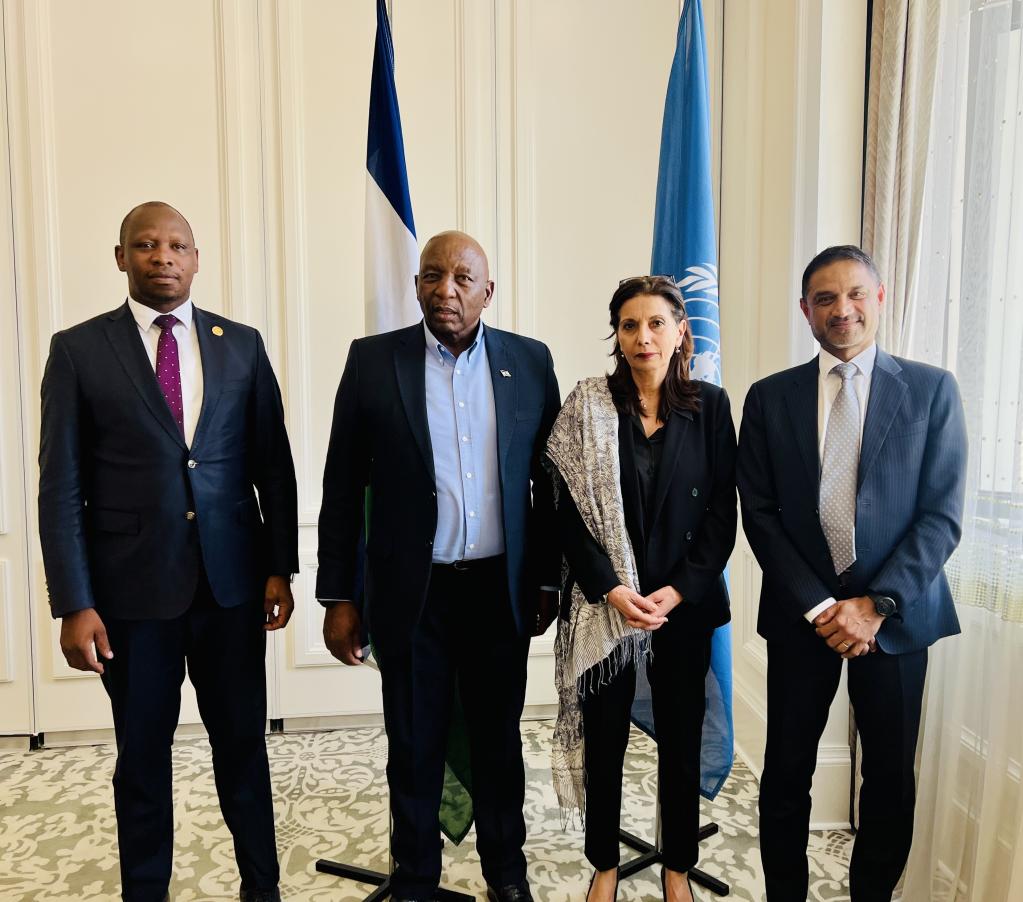
Story
17 November 2023
SEBABATSO’s Visionary Leap Forward for Lesotho's Youth
A modern tale of transformation is being written in the Mountain Kingdom of Lesotho, where King Moshoeshoe I once wove a vision of inclusiveness and unity. In October 2023, s, a visionary Prime Minister’s vanguard initiative took flight, aimed at empowering the youth of Lesotho. This initiative is SEBABATSO, which translates to 'We Grow Together', a name resonating with the core principle of inclusivity it strives to uphold.
SEBABATSO, inaugurated by The Right Honourable Prime Minister Samuel Ntsokoane Matekane on the 25th of October 2023, confronted an enormous adversary: the high rates of unemployment among the nation's youth, exacerbated by a challenging economic landscape. The initiative’s mission was bold and clear: to foster the growth of youth-led businesses, preparing them for investment on both national and international stages. It casts its net across vital sectors—agriculture, arts, science, technology, and tourism—employing entrepreneurship as the lever for economic transformation.
Acknowledging this untapped potential in STEAM fields, where only 2% of Lesotho’s tertiary graduates currently venture, the initiative is boldly confronting the underrepresentation of women in these fields, striving to create an inclusive and equitable environment for innovation.
The Prime Minister’s Initiative for Youth Empowerment is a visionary approach designed to overcome the economic challenges faced by young entrepreneurs, it incorporates a comprehensive, multi-pronged strategy, involving collaboration with key Ministries, private sector stakeholders, civil society, and potential investors.
On the launch day, over 600 hopeful young Basotho entrepreneurs convened, eager to shape their destinies. Among them was a resilient mother of three from Qacha's Nek, embodying the resolve that SEBABATSO sought to champion. This initiative, through its partnership with the United Nations in Lesotho, not only laid down a foundation for youth entrepreneurship but also held a mirror to the principle of leaving no one behind—asserting that dignity is fundamental and benefits of development should first reach those furthest behind.
The three-day event at ’Manthabiseng Convention Centre was not just a conference; it was a catalyst for change, sparking a movement that aimed to elevate Lesotho’s youth to new heights.
Teboho Semoli, a young entrepreneur and founder of a small dairy company, expressed his gratitude and enthusiasm for SEBABATSO: “Youth unemployment in Lesotho is extremely high. The government cannot employ all of us. This initiative is our lifeline, empowering us to start businesses, create jobs, and lift our communities out of poverty.”
The Prime Minister’s call for action did not fall on deaf ears. Investors, local and international, from both public and private sectors, convened to discuss and pledge their support for Basotho youth-owned businesses. Mathabo Makoko, the Lesotho Revenue Services Commissioner, highlighted the significance of such partnerships: “We have incubated youth businesses and watched them flourish, creating jobs and contributing to our nation’s prosperity.”
The SEBABATSO Initiative was not merely a response but a call to action to the youth of Lesotho, urging them to rise, innovate, and drive the nation's future. Amanda Khozi Mukwashi, the UN Resident Coordinator, rightly put it, “Empowering our youth through entrepreneurship weaves a golden thread through every facet of our economy, creating jobs, boosting our GDP, and inspiring others to follow suit.”
As discussions during the SEBABATSO conference sessions unfolded, it was apparent that revamping Lesotho’s education system is integral. By integrating critical life skills, emphasizing STEAM, and making subjects like agriculture, financial literacy, and emotional intelligence mandatory, the nation could equip its youth for the challenges of the 21st century.
The conference explored challenges and opportunities in STEAM, fostering a dialogue that spanned across the African continent. It brought attention to the necessity of protecting Basotho innovations and called for a transformative approach to education, ensuring that the future generations of Lesotho are equipped with the skills and knowledge they need to thrive.
SEBABATSO represents a significant step forward for Lesotho, as it works to unlock the potential of its youth and pave the way for a sustainable, prosperous future. Through this initiative, the Government of Lesotho is not just addressing the immediate issue of unemployment; it is investing in the nation's most valuable asset – its young people. As SEBABATSO gains momentum, it promises to be a beacon of hope, innovation, and economic transformation for Lesotho.
1 of 5
Story
20 October 2023
Ending Gender-Based Violence in Lesotho and Beyond
Gender-Based Violence (GBV) is a pernicious issue in Southern Africa where prevalence is particularly high compared to the rest of the world - between half and two-thirds of all women state that they have experienced violence at some point in their lives compared to one third internationally. GBV is a complex and multifaceted issue that has a variety of root causes, including patriarchal social norms and cultural beliefs that reinforce traditional gender roles and place men in positions of power and often perpetuate the idea that men have a right to control women and their bodies, economic inequality, poverty, unemployment, lack of access to education and resources, lack of legal protections and enforcement contributing to the impunity of GBV perpetrators, gender-based discrimination, but also substance abuse and mental health issues. These factors often interact with one another in complex ways, are highly intertwined and can vary depending on the context and culture.
Addressing GBV requires a comprehensive approach that addresses all these underlying factors concomitantly, promotes gender equality, changes harmful social norms, protects women’s rights, strengthens women’s economic empowerment and ensures access to adequate services and resources for survivors.
In the heart of Southern Africa, an alarming rise in gender-based violence (GBV), especially against women and girls, has sounded a clarion call. GBV is tearing apart the lives of women and girls, hindering development, and stifling progress. In the mountainous landscapes of Lesotho, over 86% of Basotho women and girls have experienced GBV at one point or another in their lives.
Lesotho, under the leadership of its UN Resident Coordinator, Ms Amanda Khozi Mukwashi, decided it was time to take bold steps. The RCO Lesotho knew that this vision could not be achieved in isolation. It required a collective effort, a united front to combat GBV comprehensively. They reached out to UN Resident Coordinators in Botswana, Eswatini, Namibia, South Africa, and Zambia, igniting a spark of collaboration for a transformative change.
Recognizing this urgency, the United Nations, in collaboration with the Spotlight Initiative, has initiated a ground-breaking five-year program to combat GBV across six Southern African countries: Botswana, Eswatini, Lesotho, Namibia, South Africa, and Zambia. The RCO Lesotho has played the role of a catalyst, bridging gaps, facilitating dialogue, and ensuring that the collective efforts remained on course. They meticulously coordinated the development of a Sub-Regional Joint Programme on GBV, a groundbreaking initiative aimed at tackling GBV from all angles—prevention, response, and support.
A High-level Partnership round-table was held with the participation of representatives from the six countries. The attendees included high-level officials from government, development partners, AU, SADC, private sector, civil society, and the UN. The Honorable Minister Dr. Nkosazana Dlamini Zuma – Minister in the Presidency for Women, Youth and Persons with Disabilities graced the event and the Her Majesty Queen Masenate Mohato Seeiso of the Kingdom of Lesotho joining online. Amanda Khozi Mukwashi, the UN Resident Coordinator for Lesotho, provided insights into the Lesotho-specific challenges and expectations. She touchingly remarked on the importance of peace as a precursor to a GBV-free society. For many women, peace remains an elusive concept, restricted not just to public spaces but their private sanctuaries.
Additionally, Her Majesty the Queen of Lesotho, who virtually participated in the roundtable, lent her influential voice and support to the initiative, indicating the nation's commitment at the highest level.
As part of the Southern African Development Community (SADC) region, which unfortunately records some of Africa's highest rape cases, the challenge for Lesotho is twofold. Firstly, to address the immediate issue of GBV within its boundaries and secondly, to participate in a sub-regional approach ensuring that as a collective, the Southern African nations rise above this challenge.
Collective Action and Collaboration
The discussions, punctuated by contributions from various national representatives, emphasized the importance of a collaborative approach. As noted by UN Botswana Resident Coordinator, Zia Choudhury, ending GBV requires a collective effort, bringing together governments, NGOs, academia, private sector, and, importantly, survivors.
Minister in the Presidency for South Africa responsible for Women, Youth and Persons with Disabilities Dr. Nkosazana Dlamini-Zuma's message was clear - to end GBV, we need to empower women economically and educationally, reducing their dependency on men.
The message was unmistakable; all the partners unanimously concurred that addressing gender-based violence (GBV) is imperative. What remains is the provision of the necessary resources, both in terms of technical expertise and financial support.
Way Forward for Lesotho
In line with the global Sustainable Development Goals, especially SDG 5 focusing on gender equality, Lesotho needs to strategize and implement policies that address the root causes of GBV. The nation has to invest in awareness campaigns, legislative changes, and most importantly, foster an environment where survivors feel safe to come forward.
Substance abuse, often interlinked with GBV, requires attention, as pointed out by Dr. Dlamini Zuma in her closing remarks. Establishing rapid response teams at local levels, equipped to deal with reported GBV cases promptly, can be a game-changer for Lesotho. Furthermore, by amplifying the voices of women in the fight against GBV, Lesotho can create a robust and resilient narrative of strength, hope, and change.
As Lesotho stands at the precipice of change, initiatives like these serve as a beacon of hope for the countless women and girls affected by GBV. Through collective regional efforts, backed by global partners, Lesotho has the opportunity to transform itself into a nation where every individual, regardless of gender, can live with dignity, free from fear. The journey might be arduous, but the resolve, as was showcased at the roundtable meeting, is unwavering. The hope is that in the not-too-distant future, every woman and girl in Lesotho and its neighboring countries can truly know what peace feels like.
There can be no achievement of development without peace. Peace is not just a goal; it is a prerequisite for achieving development goals, and violence remains an obstacle to these objectives.
1 of 5
Story
08 September 2023
Young People Express Own Views on Gender Equality
Young people from various facets of life engaged in conversations and discussions on Gender Equality as part of the commemoration of World Population Day this year. Ahead of the commemoration at Ha Khabo in Leribe district, UNFPA, the United Nations Population Fund partnered with Limkokwing University of Creative Technology to host a dialogue for young people to dissect this year’s theme, "Unleashing the power of gender equality: Uplifting the voices of women and girls to unlock our world’s infinite possibilities." The young people view gender equality as one of the tenets to achieving the Program of Action of the International Conference on Population and Development (ICPD) and the Sustainable Development Goals.
During this dialogue, discussions were mostly on unpacking what the theme means and how Lesotho would advance should the power of gender equality be unleashed saying with gender equality Lesotho can easily attain the Agenda 2030 agenda.
As one of the young people Zwelithini Matsoso stated, “us unleashing gender equality in Lesotho means removing barriers that among other things limit distribution of resources and unleashing the power of gender equality means unlocking both national and human resources because if we invest in humans, in young people’s education, that means we will end up with a competent and powerful resource that would contribute to our economy.”
He continued, “Investing in gender equality is about removing barriers, about unlocking not only the human development but also national development as a whole because in the end, as a country we need to harvest proceeds from the existence of the population which sometimes we refer to as the Demographic Dividend. As we invest and bridge those inequalities in the economic sphere, we will end up with young people that are able to amass assets such as land.”
The discussion also focused on the participation of women in the country’s political activities particularly the representation of women in leadership positions. One of the young people Nteboheleng Makae elaborated, “Lesotho is still lagging behind when it comes to Gender Based Violence (GBV) and gender equality. We are still behind. Women's participation in political leadership positions like in local government is still minimal. This means as a country we need to do more so that we can be able to attain the set Sustainable Development Goals.”
The young people also focused on “Bodily Autonomy.” As one of them, Thato Thinyane asserted, “Bodily autonomy is about the right to my own body. It’s about choice, dignity.” The young people also emphasized the need to have relevant knowledge and information, the right to be able to make their own choices, and for men to understand that a No to sex is a No.
At Ha Khabo where the commemoration was held, young people repeatedly called for women and girls' voices to be heard. ‘When no one listens to the voices of women and girls, it is deadly as some may be sexually assaulted and be afraid to report. Also, for those who are LGBTQ+ if parents and the public do not accept them, some of them opt to commit suicide for fear of being ridiculed.
Kefuoe Majoro who was a part of the young people’s cohort emphasized on political participation saying, “In Local Government, people tend to elect men even when women have better qualifications just because they are men. We should try to balance local government elections. We should elect women – there is a need for women’s participation.”
Another young person Lerato Motleleng said, “when parents force young girls into marriage, sometimes for economic reasons, such girls end up being pregnant too early when their bodies are not ready resulting in them sometimes losing their lives.”
1 of 5
Story
17 August 2023
Learning through Play
It is a cold Wednesday morning, a busy day for children and adults alike. Children are rushing to school trying to make it on time, while adults are trying to catch the next taxi to town where most people are employed.
For the 5-year-old Karabelo Thoko a student at Hlalele Preschool, rushing is not the case as she is never late for school. Every morning when Karabelo arrives at school, she radiates excitement. This is evident from her charming smile, the way she leaps over the school gate, and the sweet voice with which she calls out her friend's name.
Teacher Ntlaloe teaches at Hlalele Pre-School. Her school is located at a small community a few kilometers outside of Maseru City center named Ha-Hlalele. It was funded by Ireland Action Trust Project in collaboration with UNICEF Lesotho in 2019 and officially opened on the 19th of February 2020 by His Majesty King Letsie III.
"Karabelo is always on time here at school. I am always available at school when the first child arrives, so I am her first contact,” Teacher Ntlaloe explains. She says Karabelo always greets with a lively smile, and while waiting for others to arrive, Karabelo goes straight to the outdoor play area where swings, slides and ladders are waiting for her. Free play in a child-friendly space is what the new Early Childhood Care and Development curriculum (ECCD) promotes.
Teacher Ntlaloe says Karabelo is progressing well in all developmental domains. Her emotional and social skills and academic excellence are owed to the play-based curriculum that she Teacher Ntlaloe is implementing in her reception class. "Karabelo was not always this enthusiastic when she first arrived here in 2021. She was shy and she would even shy away from learning activities. But like all other children in her class, now she enjoys lessons as every lesson is based on play”, reveals Teacher Ntlaloe.
"Some of the activities that Karabelo enjoys the most are numeracy-based. She likes numbers, counting, solving number problems, measuring, spotting patterns, puzzles as well as adding and subtracting,” Teacher Ntlaloe adds. Because of the new curriculum that has aggregated learning and teaching activities according to age groups, Karabelo’s zest for play and learning has increased.
Her mother, ’Makarabelo Thokoa, mentioned that ever since Karabelo attended school, she likes to play and uses every opportunity and anything she comes across, to play. She says it seems everything they are taught at school is through singing and play. And she sings a lot! “Karabelo has become a much happier child and she loves school,” concluded ’Makarabelo.
"Play-based curriculum is very helpful – it has more activities that are integrated – numeracy, literacy, and life skills all together in a single activity. It makes the work easy for us teachers because its activities are purpose driven, and it has a teacher’s guide”, Teacher Ntlaloe says with a smile on her face.
The review of the curriculum was one of the key issues diagnosed for Lesotho to address, by Better Early Learning and Development at Scale (BELDS) diagnostic workshop held in Lesotho in 2029. BELDS was a Global Partnership for Education and UNICEF initiative. It was supported financially by GPE.
1 of 5
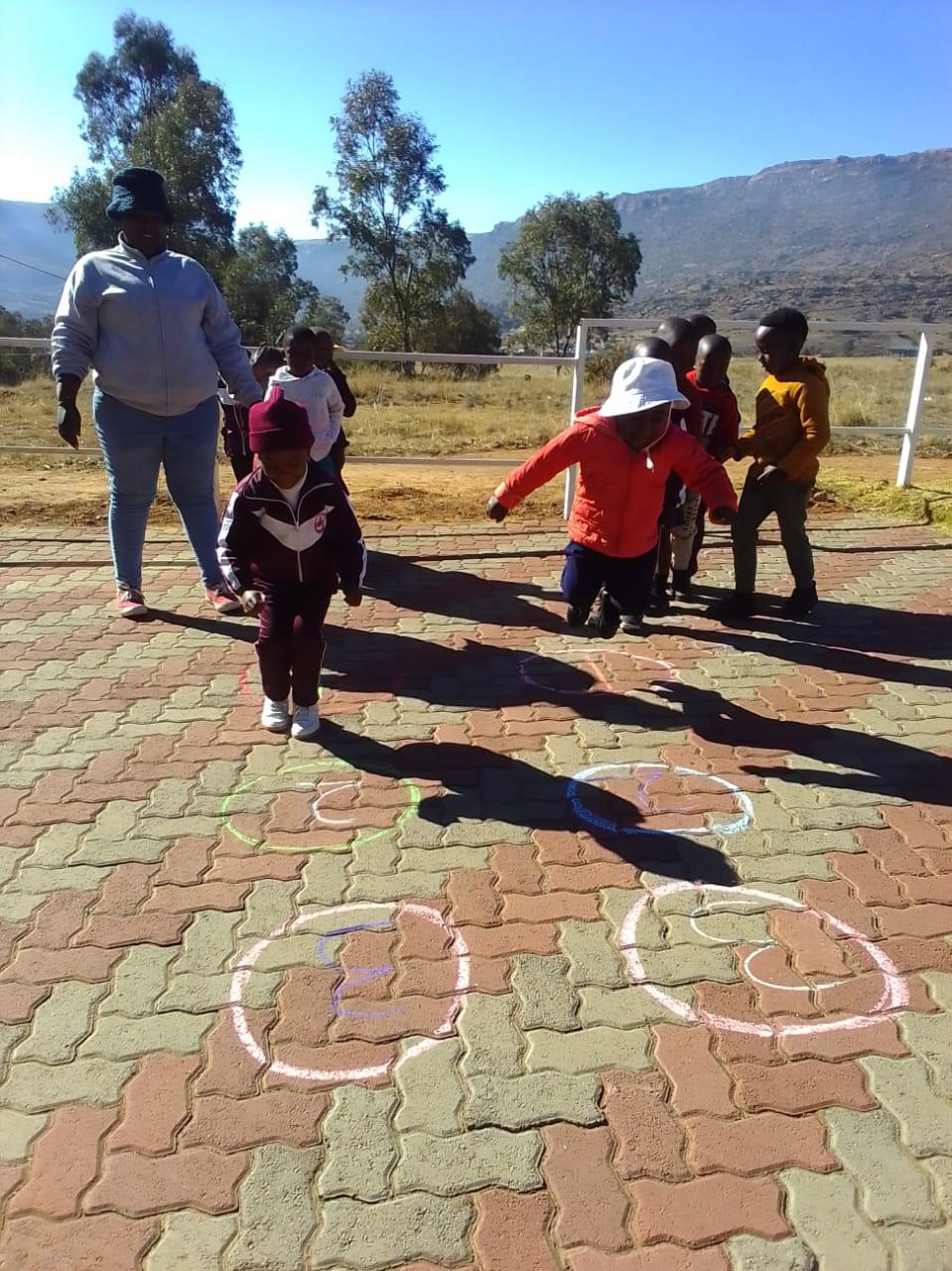
Press Release
27 March 2024
Lesotho's Ambassador For A Day Competition 2024 Winners Revealed
The Ambassadors of the European Union, China, and the United States, alongside the High Commissioners of South Africa and the United Kingdom, and the United Nations Resident Coordinator in Lesotho, have revealed the winners of the 2024 edition of the Ambassador For A Day competition. Held in commemoration of International Women's Day, the competition is dedicated to empowering and inspiring young girls across Lesotho and giving them the opportunity to gain first-hand experience of diplomatic activities in Lesotho.The Ambassador for a Day initiative in Lesotho returned for its second year, following its successful launch in 2023, offering young girls the unique opportunity to step into the shoes of an Ambassador for a Day and receive mentorship throughout the year from their respective Embassy and international organization, engaging in various individual and group activities.Six girls were chosen from a pool of submissions for their ideas on advancing gender equality in society. Each Embassy will continue to mentor and support one girl, showcasing their dedication to empowering young women and fostering the next generation of leaders.The winners are:Office of the Resident Coordinator of the United Nations - Kananelo Matsimane
Delegation of the European Union to Lesotho – Motšelisi Mohapeloa
British High Commission – Bokang Nkabi
Embassy of the People's Republic of China – Reamohetsoe Letooane
High Commission of the Republic of South Africa – Kamohelo Khabele
Embassy of the United States of America – Motšelisi Pitso
The competition was aimed at girls aged 14-18 years old in Lesotho, inspiring them to submit an 800-word essay or a 2-minute video addressing one of two thought-provoking questions:"What do you think is the best investment to enhance gender equality in your community?" or "How can you contribute towards accelerating progress towards creating a more inclusive environment for all?"This initiative will serve as a platform for young girls to connect, learn, and broaden their horizons, fostering a supportive environment for growth and development. The Ambassador For A Day programme aims to instill confidence and ambition in the next generation of leaders by providing real-world experiences and mentorship. This collaborative effort between the diplomatic missions in the Kingdom not only provides invaluable experiences for young girls but also underscores the significance of mentorship and empowerment in shaping a brighter future for young girls in Lesotho. The continuation of this programme signifies a dedication to fostering leadership skills and promoting gender equality.Contact persons
Delegation of the European Union to Lesotho
Mookho Makhetha
E-mail: mookho.makhetha@eeas.europa.eu
Website: https://www.eeas.europa.eu/delegations/lesotho_enBritish High Commission
Mahlohonolo Mohapi
E-mail: mahlohonolo.mohapi@fcdo.gov.uk
Facebook: https://www.facebook.com/ukinlesotho/
Embassy of the People's Republic of China
Tel: 22324340
E-mail: chinaemb_ls@mfa.gov.cn
Website: https://ls.china-embassy.gov.cn/South African High Commission: Maseru
Phumzile Masango
Mobile: +266 5880 7717
E-mail: masangop@dirco.gov.za
US Embassy Maseru
Charles Blake
E-mail: infomaseru@state.gov
Website: ls.usembassy.govOffice of the Resident Coordinator of the United Nations
Reitumetse Russell
E-mail: reitumetse.russell@un.org
Website: https://lesotho.un.org/en
Delegation of the European Union to Lesotho – Motšelisi Mohapeloa
British High Commission – Bokang Nkabi
Embassy of the People's Republic of China – Reamohetsoe Letooane
High Commission of the Republic of South Africa – Kamohelo Khabele
Embassy of the United States of America – Motšelisi Pitso
The competition was aimed at girls aged 14-18 years old in Lesotho, inspiring them to submit an 800-word essay or a 2-minute video addressing one of two thought-provoking questions:"What do you think is the best investment to enhance gender equality in your community?" or "How can you contribute towards accelerating progress towards creating a more inclusive environment for all?"This initiative will serve as a platform for young girls to connect, learn, and broaden their horizons, fostering a supportive environment for growth and development. The Ambassador For A Day programme aims to instill confidence and ambition in the next generation of leaders by providing real-world experiences and mentorship. This collaborative effort between the diplomatic missions in the Kingdom not only provides invaluable experiences for young girls but also underscores the significance of mentorship and empowerment in shaping a brighter future for young girls in Lesotho. The continuation of this programme signifies a dedication to fostering leadership skills and promoting gender equality.Contact persons
Delegation of the European Union to Lesotho
Mookho Makhetha
E-mail: mookho.makhetha@eeas.europa.eu
Website: https://www.eeas.europa.eu/delegations/lesotho_enBritish High Commission
Mahlohonolo Mohapi
E-mail: mahlohonolo.mohapi@fcdo.gov.uk
Facebook: https://www.facebook.com/ukinlesotho/
Embassy of the People's Republic of China
Tel: 22324340
E-mail: chinaemb_ls@mfa.gov.cn
Website: https://ls.china-embassy.gov.cn/South African High Commission: Maseru
Phumzile Masango
Mobile: +266 5880 7717
E-mail: masangop@dirco.gov.za
US Embassy Maseru
Charles Blake
E-mail: infomaseru@state.gov
Website: ls.usembassy.govOffice of the Resident Coordinator of the United Nations
Reitumetse Russell
E-mail: reitumetse.russell@un.org
Website: https://lesotho.un.org/en
1 of 5
Press Release
28 February 2024
PRINCIPALITY OF MONACO HELPS WFP PROVIDE HOME GROWN SCHOOL FEEDING IN LESOTHO
Monaco’s contribution will help strengthen food and nutrition support to some 10,000 school children in 80 schools and provide agricultural and financial literacy training for 300 smallholder farmers in Quthing and Mohale’s hoek districts. Under the national home-grown school feeding programme, WFP sources local produce from smallholder farmers to provide children nutritious mid-day meals on every school day. The programme links local farmers to the education sector by facilitating their access to the school feeding market. “We are grateful to the Principality of Monaco for this timely support at a critical time in the country,” says Aurore Rusiga, WFP’s Country Director in Lesotho. “The school feeding programme is a game changer. Its benefits are evident and manifold in the communities we work. The schools provide local farmers with a predictable outlet for their products, leading to a stable income, more investments and higher production. The children enjoy nutritious, diversified food, making it more likely that they will stay in school, be healthier, perform better thus improve their future prospects.”
Through this initiative which is implemented in partnership with both the Ministry of Education and Training and the Ministry of Agriculture, Food Security and Nutrition, school children will have the opportunity to enhance their nutrition through provision of beans, eggs, fruits, and vegetables. “The Government of the Principality of Monaco is deeply convinced that school feeding programs, one of the Monegasque Cooperation’s flagship programmes, have direct and multiple benefits to the child – in terms of health, nutrition, access to education and learning”, says Bénédicte SCHUTZ, Special Representative for International Cooperation. “We are very pleased to work alongside WFP through this new partnership in Lesotho, with a mutual vision to help the most vulnerable in the fight against hunger and accessing their right to food.”
WFP’s School Feeding programme supports the Ministry of Education’s development plan, which aims to educate all children, especially those from vulnerable families. Over the past decade, school feeding has helped ensure access to quality education by reduce the rate of dropping out as well as improve child nutrition and increase child enrolment in schools. In 2023, WFP and its partners provided nutritious meals to over 50,000 pre-school learners between the ages of 2 and 5 in 2,500 schools while more than 100 farmers sold their produce to schools.ENDS The United Nations World Food Programme is the world’s largest humanitarian organization saving lives in emergencies and using food assistance to build a pathway to peace, stability and prosperity for people recovering
from conflict, disasters and the impact of climate change.
Follow us on Twitter @wfp_media, @WFP_Africa & @aurorerusigawfp
For more information please contact:
Morongoe Masilo, WFP/Lesotho, Mob. +266 59912859 Email: morongoe.masilo@wfp.org
Malehloa Letsie, WFP/ Lesotho, Mob. +266 50668018 Email: malehloa.letsie@wfp.org
Through this initiative which is implemented in partnership with both the Ministry of Education and Training and the Ministry of Agriculture, Food Security and Nutrition, school children will have the opportunity to enhance their nutrition through provision of beans, eggs, fruits, and vegetables. “The Government of the Principality of Monaco is deeply convinced that school feeding programs, one of the Monegasque Cooperation’s flagship programmes, have direct and multiple benefits to the child – in terms of health, nutrition, access to education and learning”, says Bénédicte SCHUTZ, Special Representative for International Cooperation. “We are very pleased to work alongside WFP through this new partnership in Lesotho, with a mutual vision to help the most vulnerable in the fight against hunger and accessing their right to food.”
WFP’s School Feeding programme supports the Ministry of Education’s development plan, which aims to educate all children, especially those from vulnerable families. Over the past decade, school feeding has helped ensure access to quality education by reduce the rate of dropping out as well as improve child nutrition and increase child enrolment in schools. In 2023, WFP and its partners provided nutritious meals to over 50,000 pre-school learners between the ages of 2 and 5 in 2,500 schools while more than 100 farmers sold their produce to schools.ENDS The United Nations World Food Programme is the world’s largest humanitarian organization saving lives in emergencies and using food assistance to build a pathway to peace, stability and prosperity for people recovering
from conflict, disasters and the impact of climate change.
Follow us on Twitter @wfp_media, @WFP_Africa & @aurorerusigawfp
For more information please contact:
Morongoe Masilo, WFP/Lesotho, Mob. +266 59912859 Email: morongoe.masilo@wfp.org
Malehloa Letsie, WFP/ Lesotho, Mob. +266 50668018 Email: malehloa.letsie@wfp.org
1 of 5
Press Release
09 December 2022
Human Rights Day Statement by the UN Resident Coordinator
The end of the 16 days of activism against gender based violence is a hard phenomenon to celebrate or commemorate. This is because of the need to advocate for an end to gender based violence is work we should do all year. This time coincides always with an important time when the world celebrates and commemorates Human Rights Day.
This year’s Human Rights Day theme is celebrating the 75th Anniversary of the Universal Declaration of Human Rights (UDHR) under the slogan “Dignity, Freedom and Justice for All”. In his message, Volker Türk the UN High Commissioner for Human Rights has this year underlined that “On this Human Rights Day, we reiterate the need and relevance of human rights now as they were seventy-six years ago. Our hope is to increase knowledge of the UDHR as a foundational blueprint for taking concrete actions to stand up for human rights and tackle pressing global issues today”.
To ensure that the ideals enshrined in the Universal Declaration of Human Rights become reality for Basotho, there is a role for everyone to play in ensuring respect, promotion and protection of human rights for all. The passing of The Persons with Disability Equity Act by the government of Lesotho has signified the commitment to ensure and safeguard the rights of people with disability in Lesotho. This Act now needs to be fully implemented to truly ensure that all Basotho with disabilities enjoy the full protection of and provision of their rights. Human rights start at the family level permeating to communities, schools, the workplace and to parliament. Indeed, as one of the lead drafters of the Universal Declaration Eleanor Roosevelt said in 1958:
“Where, after all, do universal human rights begin? In small places, close to home—so close and so small that they cannot be seen on any maps of the world. Yet they are the world of the individual person; the neighborhood he/she lives in; the school or college he/she attends; the factory, farm, or office where he/she works. Such are the places where every man, woman, and child seek equal justice, equal opportunity, equal dignity without discrimination. Unless these rights have meaning there, they have little meaning anywhere.”
The UN commits to continue working with the Government of Lesotho towards strengthening a national human rights legislative, policy and institutional framework for the promotion and protection of human rights. One of the institutions that will strengthen the national protection framework for human rights is the Human Rights Commission whose establishment is still awaited.
This year’s activities on the 16 Days of Activism Against Gender Based Violence across the country have indicated a need for more engagement, more platforms and more importantly a need for a better coordinated and systematic approach to ending gender based violence in Lesotho. Throughout the several activities in commemoration of 16 Days of Activism, numerous stories were told of women and girls that have survived gender based violence and remembered with sadness those that have died and whose stories we can only tell. We heard from a sixteen-year-old girl who as a result of being raped by her father is now a young mother to her own sister. Of the many dreams she has, she shared how she would like to go back to school and be able to raise her child.
Gender based violence does not only affect individuals through the violence in their bodies, but it also affects children born of such incidences, children that live through these circumstances, affects productivity and production thus the economy. It has a bearing on our health systems, affects development and truly impacts all aspects of our lives. The UN joins the people of Lesotho to advocate against gender based violence for 365 days.
The Universal Declaration of Human Rights is as relevant today as it was when it was adopted 75 years ago. It has withstood the tests of the passing years, and the advent of dramatic new technologies and social, political and economic developments that its drafters could not have foreseen. For instance, its provisions are so fundamental that they can be applied to every new dilemma including new phenomena like artificial intelligence, the digital world and countering the effects of climate change on people.
Everyone is entitled to all the freedoms listed in the Universal Declaration "without distinction of any kind such as race, colour, sex, language, religion, political or other opinion, national or social origin, property, birth or other status."
Gender is a concept that is addressed in almost every clause of the Declaration. For its time, the document was remarkably lacking in sexist language. The document refers to "everyone," "all" or "no one" throughout its 30 Articles. Indeed, for the first time in the history of international law-making, women played a prominent role in drafting the Universal Declaration.
But, 75 years after its adoption, the work the Universal Declaration lays down for us to do is far from over, and it never will be. It is the duty of everyone to ensure that the provisions of the Universal Declaration and all the international and regional treaties to which Lesotho is party are turned into a reality for the people of Lesotho especially the most marginalised.
1 of 5
Press Release
07 December 2021
Lesotho: European Union continues to support those facing food insecurity through the World Food Programme
The funding, provided by the EU’s Civil Protection and Humanitarian Aid Operations (ECHO) will be used to reach families worst affected by the impacts of rising climate shocks, food prices and the prolonged effects of COVID-19 in the capital Maseru and Qacha’s Nek districts; including families badly affected by recent windstorms in Sehlaba-Thebe, Qacha`s Nek. Each household will receive the equivalent of € 54 in cash, per month, allowing them to buy food items from local markets.
“The EU continues to support partners such as WFP in order to provide life-saving food assistance to the most vulnerable people suffering the effects of climate shocks and the COVID-19 pandemic” said Ms. Paola Amadei, EU Ambassador to Lesotho. “We are aware that people in urban and peri-urban areas who lost their jobs or businesses have been hit hard by climate shocks, and we want to contribute to alleviating their suffering as a consequence of the pandemic."
The support from the EU comes at a crucial time, when hunger is peaking with over 470,000 of the population experiencing acute levels of food insecurity through March 2022. Food prices have increased, and households are still feeling the long-term impacts of COVID-19 control measures on their livelihoods such as loss of jobs and severe reduction in remittances, with many migrant workers returning to Lesotho after losing their jobs.
“We thank the European Union for continuing their support, allowing WFP and the government to provide much-needed assistance to vulnerable people affected by COVID-19 and climate shocks”, said Ms. Aurore Rusiga, WFP Country Director and Representative in Lesotho. “This timely contribution will help WFP save lives by supporting those who are most at risk and change lives by improving the food security and nutrition of targeted people.”
WFP will undertake Social Behaviour Change Communication (SBCC) initiatives during cash distributions to provide information on basic hygiene for the prevention of COVID-19, as well as information on nutritional practices to enhance purchasing choices for households to meet their nutritional needs.
The European Union is one of WFP’s main donors in Lesotho. The latest contribution brings the total contributions to € 7 million in the last five years.
1 of 5
Press Release
08 November 2021
Germany provides support to vulnerable people in Lesotho
This contribution will improve access to food and ensure that vulnerable people, including women, have access to an adequate and nutritious diet in times of need, particularly during the lean season, more commonly referred to as the period between planting and harvesting. The assistance to the identified people will be through monthly cash transfers via mobile money and commodity voucher assistance.
“Germany hopes that this funding will contribute to mitigating the suffering of vulnerable people at a time when more of them are in need of humanitarian assistance,” said Andreas Pesche, German Ambassador to South Africa, Lesotho and Eswatini, based in Pretoria. “We commend WFP for its continuous efforts to improve the lives of vulnerable people in the southern Africa region.”
According to the 2021 Integrated Food Security Phase Classification, about 312,000 people of the total rural population in Lesotho are food insecure and the Lesotho vulnerability Assessment report estimated that a total of 158,000 urban population in Lesotho is food insecure. In total, about 470,00 people are food insecure and require humanitarian assistance to reduce food gaps, protect and restore livelihoods and prevent acute malnutrition. “WFP welcomes this timely and generous contribution from the people of Germany to enable us to respond to the most urgent humanitarian needs across the country, especially during the difficult times of the COVID-19 pandemic which has impacted already vulnerable groups in Lesotho, driving them into increased food insecurity,” said Lesotho WFP Country Director and Representative, Aurora Rusiga. “This contribution from Germany will go a long way in assisting vulnerable people who are finding it increasingly difficult to put food on the table and in dire need of support.”
WFP aims to assist 122,000 food insecure people through emergency response assistance until the end of the lean season in March 2022 with monthly cash transfers via mobile money and commodity vouchers. Beneficiaries receive USD 47 per month to help meet their basic food needs. Presently, the available funding will allow WFP to assist a total of 44,000 food insecure people.
“Germany hopes that this funding will contribute to mitigating the suffering of vulnerable people at a time when more of them are in need of humanitarian assistance,” said Andreas Pesche, German Ambassador to South Africa, Lesotho and Eswatini, based in Pretoria. “We commend WFP for its continuous efforts to improve the lives of vulnerable people in the southern Africa region.”
According to the 2021 Integrated Food Security Phase Classification, about 312,000 people of the total rural population in Lesotho are food insecure and the Lesotho vulnerability Assessment report estimated that a total of 158,000 urban population in Lesotho is food insecure. In total, about 470,00 people are food insecure and require humanitarian assistance to reduce food gaps, protect and restore livelihoods and prevent acute malnutrition. “WFP welcomes this timely and generous contribution from the people of Germany to enable us to respond to the most urgent humanitarian needs across the country, especially during the difficult times of the COVID-19 pandemic which has impacted already vulnerable groups in Lesotho, driving them into increased food insecurity,” said Lesotho WFP Country Director and Representative, Aurora Rusiga. “This contribution from Germany will go a long way in assisting vulnerable people who are finding it increasingly difficult to put food on the table and in dire need of support.”
WFP aims to assist 122,000 food insecure people through emergency response assistance until the end of the lean season in March 2022 with monthly cash transfers via mobile money and commodity vouchers. Beneficiaries receive USD 47 per month to help meet their basic food needs. Presently, the available funding will allow WFP to assist a total of 44,000 food insecure people.
1 of 5
Latest Resources
1 / 11
1 / 11

